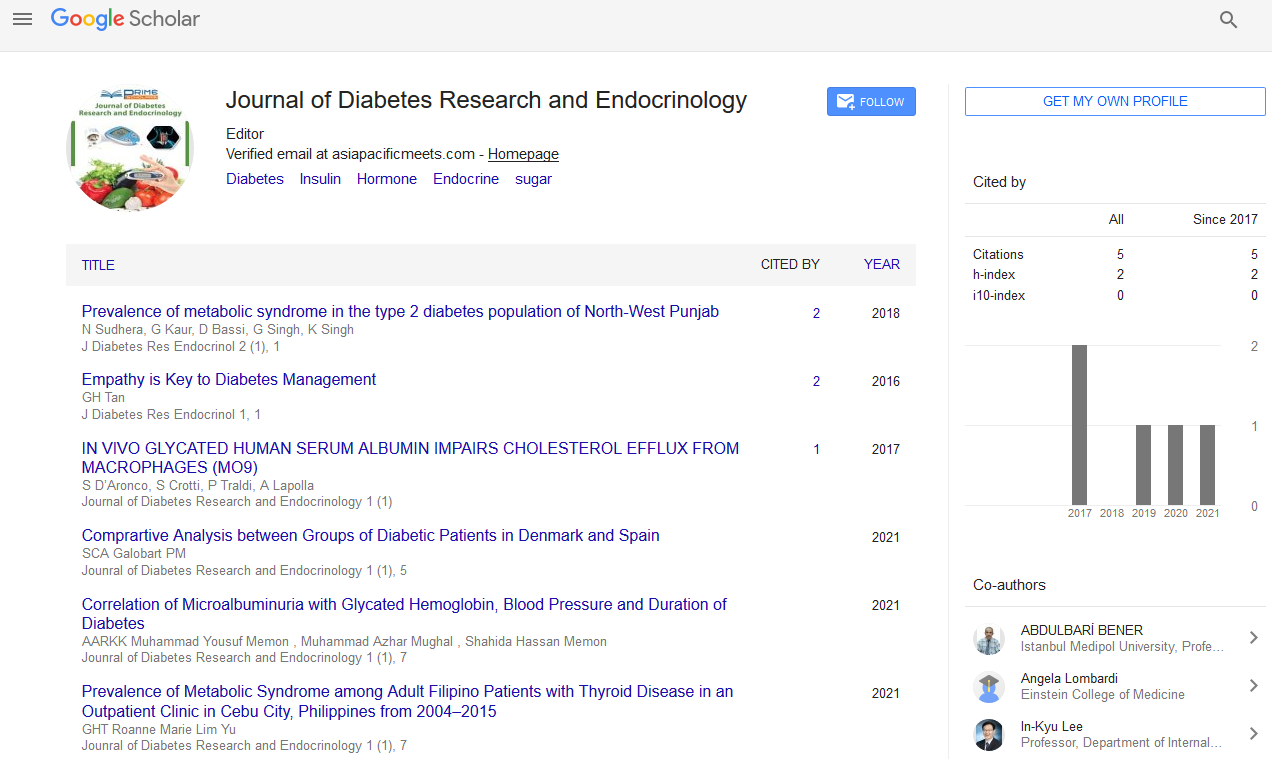Commentary - (2024) Volume 8, Issue 2
Medical Treatments for Gestational Diabetes
Lucas Butler*
Department of Endocrinology, West of Scotland University, UK
*Correspondence:
Lucas Butler,
Department of Endocrinology, West of Scotland University,
UK,
Email:
Received: 29-May-2024, Manuscript No. IPJDRE-24-20957;
Editor assigned: 31-May-2024, Pre QC No. IPJDRE-24-20957 (PQ);
Reviewed: 14-Jun-2024, QC No. IPJDRE-24-20957;
Revised: 19-Jun-2024, Manuscript No. IPJDRE-24-20957 (R);
Published:
26-Jun-2024, DOI: 10.36648/ipjdre.08.02.16
Description
Gestational diabetes is a condition characterized by high blood
sugar levels that develop during pregnancy and can have
significant health implications for both the mother and the
baby. While lifestyle modifications such as diet and exercise are
often the first line of defines in managing gestational diabetes,
medical treatments may be necessary for some women to
maintain optimal blood glucose levels. This article explores the
various medical treatments available for gestational diabetes,
focusing on their benefits and applications. Gestational diabetes
occurs when the body cannot produce enough insulin to meet
the increased demands during pregnancy, leading to elevated
blood sugar levels. This condition typically arises in the second
or third trimester and is diagnosed through glucose tolerance
tests. Proper management is crucial to prevent complications
such as macrosomia (large birth weight), preterm birth,
and preeclampsia. Before resorting to medical treatments,
healthcare providers usually recommend lifestyle modifications
to manage gestational diabetes. These include. Emphasizing a
balanced diet rich in whole grains, vegetables, lean proteins,
and healthy fats while limiting simple sugars and refined
carbohydrates. Engaging in moderate physical activity, such
as walking or prenatal yoga, to help improve insulin sensitivity
and lower blood sugar levels. Regularly checking blood
glucose levels to ensure they remain within the target range.
When lifestyle changes alone are insufficient to control blood
sugar levels, medical treatments become necessary. Insulin
is the most commonly prescribed medication for gestational
diabetes. It is effective in controlling blood sugar levels without
crossing the placenta, ensuring safety for the baby. There are
different types of insulin, including rapid-acting, short-acting,
intermediate-acting, and long-acting insulins. The choice
depends on individual blood sugar patterns and needs. Insulin
is typically administered via subcutaneous injections, and the
dosage is tailored to each patient’s requirements. Some women
may need multiple injections throughout the day to maintain
stable blood sugar levels. Metformin is an oral medication
that helps improve insulin sensitivity and lower blood sugar
levels. It is increasingly used for managing gestational diabetes,
especially when insulin therapy is not preferred or feasible.
Another oral medication, glyburide, stimulates the pancreas
to produce more insulin. However, its use is less common due
to potential risks and variability in effectiveness compared to
insulin. Effective management of gestational diabetes requires
close monitoring and regular adjustments to treatment plans.
This includes. Regular monitoring of blood sugar levels helps
ensure they remain within the target range. This is usually done
four to six times a day, including fasting and postprandial (after
meals) readings. Based on blood sugar readings, healthcare
providers may adjust insulin dosages to achieve optimal control.
This requires ongoing communication between the patient and
the healthcare team. Regular ultrasounds and other tests may
be conducted to monitor the baby’s growth and development,
ensuring there are no complications arising from gestational
diabetes. While medical treatments for gestational diabetes are
generally safe, there are some risks and considerations to keep
in mind. Insulin therapy can sometimes lead to low blood sugar
levels (hypoglycaemia). Symptoms include dizziness, sweating,
and confusion. It’s important to recognize these signs and
have quick-acting glucose sources available. Metformin and
glyburide can cause gastrointestinal discomfort, such as nausea
or diarrhoea. These side effects are usually mild and temporary.
Consistent adherence to prescribed treatments and monitoring
schedules is crucial for effective management. Missed doses or
irregular monitoring can lead to complications. After delivery,
blood sugar levels typically return to normal. However, women
who had gestational diabetes are at a higher risk of developing
Type 2 diabetes later in life.
Acknowledgement
None.
Conflict Of Interest
The author’s declared that they have no conflict of interest.
Citation: Butler L (2024) Medical Treatments for Gestational Diabetes. J Diab Res Endocrinol. 8:16.
Copyright: © 2024 Butler L. This is an open-access article distributed under the terms of the Creative Commons Attribution License, which permits unrestricted use, distribution, and reproduction in any medium, provided the original author and source are credited.

